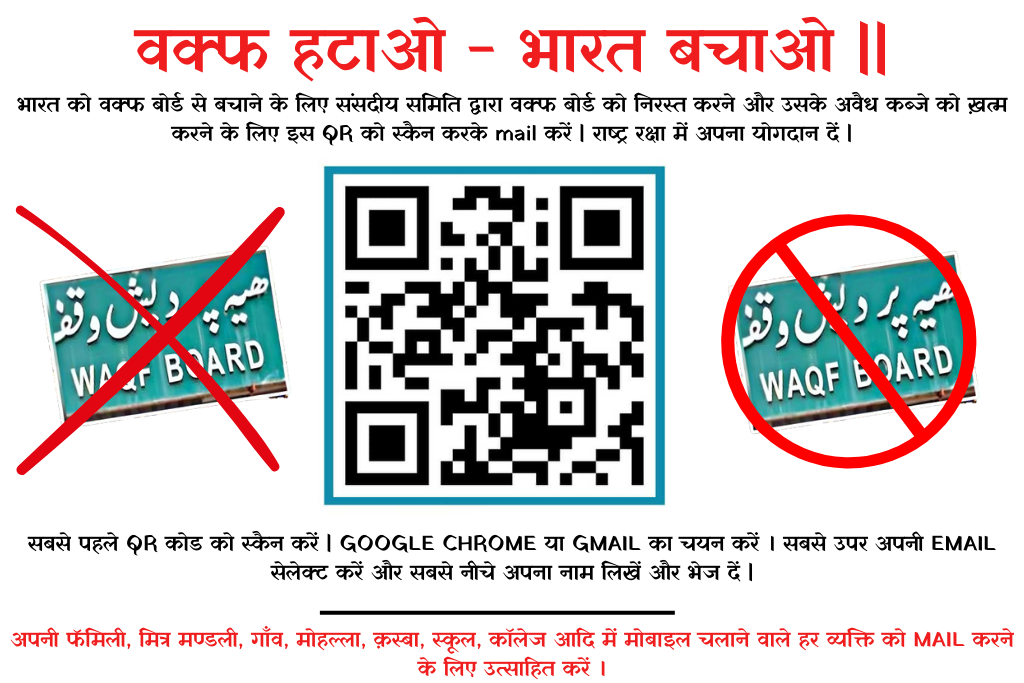Hello friends, today we have brought new news related to the Waqf Board QR Code for you. A fierce battle has been brewing over the Waqf Bill QR Code ever since the bill was presented in Parliament. This bill has sparked intense debate, drawing strong reactions from both the ruling party and the opposition. In this article, we will dive into the reasons behind this controversy, why the opposition is labeling the bill unconstitutional, and why the ruling party is standing in its support.

The Waqf Board is a significant institution responsible for managing properties and assets meant for religious and charitable purposes, mainly for the Muslim community in India. Over the years, the Waqf Board has been responsible for ensuring the proper utilization of these assets. However, the introduction of a Waqf Board QR Code system as part of the new Waqf Bill has ignited a political firestorm.
Controversy Surrounding The Waqf Bill QR Code
Since the Waqf Bill was tabled, it has seen opposition from several political parties and leaders. The key point of contention is the Waqf Board QR Code, which, according to the bill, would be implemented to track and monitor properties managed by the Waqf Board. The opposition claims that this system would infringe upon the autonomy of the Waqf Board and could potentially violate the constitutional rights of minority communities, particularly Muslims.
Read Also: How to Send an Email for Waqf Board Law Support Using QR Code – A Step-by-Step Guide
Opposition leaders argue that introducing a QR Code for monitoring Waqf properties is an indirect way to gain control over these properties. They believe that this could lead to increased government intervention and the erosion of the Waqf Board’s authority, which has been functioning independently for centuries. Furthermore, they claim that the Constitution of India guarantees the rights of religious minorities to manage their own religious and charitable institutions, and this bill is in violation of those rights.
Waqf Board QR Code System Is Necessary
On the other hand, the ruling party has taken a firm stand in support of the bill. They argue that the introduction of the Waqf Board QR Code system would bring much-needed transparency and accountability to the management of Waqf properties. According to the government, the system would help curb corruption and ensure that Waqf properties are used for their intended purposes. They also claim that this bill is not targeting any religious community but is instead aimed at modernizing the system to benefit the people.
Waqf Board QR Code And Public Response
Amidst this political battle, a movement has emerged among some sections of the Hindu community. It is being reported that certain groups are using the Waqf Board QR Code to send mass emails in opposition to the bill. These groups are reportedly calling for the bill to be scrapped, arguing that it is part of a larger conspiracy to take control of Waqf properties. Some claim that this is a threat to religious harmony and are urging others to join the movement against the bill. The ruling party, however, has dismissed these claims and reiterated that the Waqf Bill, including the QR Code system, is designed to benefit all communities by promoting transparency.
Waqf Board Email Counting Result Today Live Update
Conclusion
In conclusion, the Waqf Board QR Code has become a symbol of the ongoing political and social battle surrounding the Waqf Bill. While the opposition sees it as a violation of constitutional rights, the ruling party insists it is a step towards reform and modernization. This debate is far from over, and it remains to be seen how it will evolve in the coming days. One thing is certain—this issue has sparked significant public interest, and its outcome will likely have long-lasting implications for religious and political dynamics in India.

